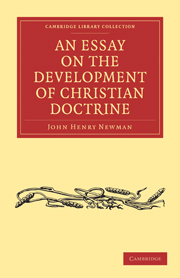Book contents
- Frontmatter
- ADVERTISEMENT
- Contents
- INTRODUCTION
- CHAPTER I ON THE DEVELOPMENT OF IDEAS
- CHAPTER II ON THE DEVELOPMENT OF CHRISTIAN IDEAS, ANTECEDENTLY CONSIDERED
- CHAPTER 3 ON THE NATURE OF THE ARGUMENT IN BEHALF OF THE EXISTING DEVELOPMENTS OF CHRISTIANITY
- CHAPTER IV ILLUSTRATIONS OF THE ARGUMENT IN BEHALF OF THE EXISTING DEVELOPMENTS OF CHRISTIANITY
- CHAPTER V ILLUSTRATIONS CONTINUED
- CHAPTER VI ILLUSTRATIONS CONTINUED
- CHAPTER VII ILLUSTRATIONS CONTINUED
- CHAPTER VIII ILLUSTRATIONS CONCLUDED
CHAPTER 3 - ON THE NATURE OF THE ARGUMENT IN BEHALF OF THE EXISTING DEVELOPMENTS OF CHRISTIANITY
Published online by Cambridge University Press: 16 May 2011
- Frontmatter
- ADVERTISEMENT
- Contents
- INTRODUCTION
- CHAPTER I ON THE DEVELOPMENT OF IDEAS
- CHAPTER II ON THE DEVELOPMENT OF CHRISTIAN IDEAS, ANTECEDENTLY CONSIDERED
- CHAPTER 3 ON THE NATURE OF THE ARGUMENT IN BEHALF OF THE EXISTING DEVELOPMENTS OF CHRISTIANITY
- CHAPTER IV ILLUSTRATIONS OF THE ARGUMENT IN BEHALF OF THE EXISTING DEVELOPMENTS OF CHRISTIANITY
- CHAPTER V ILLUSTRATIONS CONTINUED
- CHAPTER VI ILLUSTRATIONS CONTINUED
- CHAPTER VII ILLUSTRATIONS CONTINUED
- CHAPTER VIII ILLUSTRATIONS CONCLUDED
Summary
PRESUMPTIVE CHARACTER OF THE PROOF.
In proceeding to the consideration of the character of the argument adducible in behalf of the truth of the existing developments of Christianity, we must first direct our attention to the preponderating force of antecedent probability in all practical matters, where it exists. If this probability is great, it almost supersedes evidence altogether. This is instanced in every day's experience: whether the particular conclusion, in this or that case, be true or not is not here the question; the correctness of the process itself is shown by its general adoption. “Trifles light as air,” the poet tells us, “are to the jealous, confirmations strong, As proofs of Holy Writ.” Did a stranger tell us in a crowd to mind our purses, we should believe him, though in the sequel he turned out to be the thief, and gave us warning in order to gain them. A single text is sufficient to prove a doctrine to the well-disposed or the prejudiced. “Not forsaking the assembling of ourselves together” is sufficient to lead the Christian mind to observe the duty of social worship; and “Forbidding to marry” is sufficient proof that Rome is Antichrist to those who have been educated in that doctrine. Again, to take an instance in a different matter, when we are fully convinced that an important step which another proposes is in itself right, we insist but generally on self-examination, waiting, and other preparation in his particular case; but in proportion as we are doubtful of its religiousness and happiness do we make much of these, lengthening his probation and putting obstacles in the way of his moving.
- Type
- Chapter
- Information
- An Essay on the Development of Christian Doctrine , pp. 131 - 202Publisher: Cambridge University PressPrint publication year: 2010First published in: 1845



